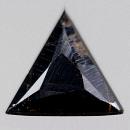|
|
||||||||||||||||
|
||||||||||||||||
|
||||||
|
|
|
|
Polycrase-(Y)
|
|
| | |
| Discovery in 1870; IMA status: Valid (pre-IMA; Grandfathered) | ||
|
| ||
|
Chemistry |
|
|
| |
|
(Y,Ca,Ce,U,Th)(Ti,Nb,Ta)2O6 | |
|
|
Yttrium Calcium Cerium Thorium Niobium Tantalum Oxide |
|
Molecular Weight: |
372.96 gm |
|
Composition: |
Calcium |
1.07 % |
Ca |
1.50 % |
CaO |
|
|
Cerium |
3.76 % |
Ce |
4.40 % |
Ce2O3 |
|
|
Yttrium |
11.92 % |
Y |
15.14 % |
Y2O |
|
|
Thorium |
6.22 % |
Th |
7.08 % |
ThO2 |
|
|
Uranium |
6.38 % |
U |
7.67 % |
UO3 |
|
|
Tantalum |
14.56 % |
Ta |
17.77 % |
Ta2O5 |
|
|
Titanium |
15.41 % |
Ti |
25.70 % |
TiO2 |
|
|
Niobium |
14.95 % |
Nb |
21.38 % |
Nb2O5 |
|
|
Oxygen |
25.74 % |
O |
|
|
|
|
|
100.00 % |
|
100.00 % |
= TOTAL OXIDE |
|
|
|
||||
|
Classification |
|
|
| |
|
Oxides | |
|
4/D.19-10 | |
|
|
4 : OXIDES (Hydroxides, V[5,6] vanadates, arsenites, antimonites, bismuthites, sulfites, selenites, tellurites, iodates) |
|
Related to: |
Polycrase Group. The Yttrium-dominant analogue of Uranopolycrase. |
|
Varieties: |
None |
|
Synonyms: |
Polycrase, Polycrasite |
|
|
|
|
Crystal Data |
|
|
|
|
|
Orthorhombic - Dipyramidal; commonly Metamict (Amorphous) |
|
|
Crystals are stout prismatic || [001], typically flattened on {010}, may be striated || [001] by twinning, to 5 cm; commonly in parallel to radiating aggregates; massive. |
|
|
Common on {201}; rare on {101} or {013} |
|
|
|
|
|
Physical Properties |
|
|
|
|
|
None |
|
|
Conchoidal to Subconchoidal |
|
|
Brittle |
|
|
5.5 - 6.5 |
|
|
4.70 - 5.90 (g/cm3); may be less when altered |
|
|
None |
|
|
Strong; GRapi = 603,860.75 (Gamma Ray American Petroleum Institute Units) |
|
|
|
|
|
Optical Properties |
|
|
|
|
|
Black, Brownish Black, Greenish Black; Brown to Yellow-Brown in transmitted light |
|
|
Opaque, transparent in thin fragments |
|
|
Brilliant Submetallic, Waxy to Resinous on fractures |
|
|
2.250 Isotropic |
|
|
0.00 (Isotropic) |
|
|
n/a |
|
|
None |
|
|
|
|
|
Occurances |
|
|
|
|
|
Geological Setting: |
In granite pegmatites; rarely as a detrital mineral. |
|
Common Associations: |
Gadolinite, Columbite, Xenotime, Monazite, Allanite, Zircon, Garnet, Beryl, Magnetite, Fluorite |
|
Common Impurities: |
Ca, Ce, U, Th, Ta |
|
Type Locality: |
Rasvåg feldspar quarries, Hidra (Hitterø), Flekkefjord, Vest-Agder, Norway |
|
Year Discovered: |
1870 |
|
View mineral photos: | |
|
|
|
|
More Information |
|
|
|
|
|
| |
|
|
|
|
Less
common than euxenite. Some localities for well-characterized
material include: from Rasvåg, Hidra (Hitterö) Island,
near Flekkefjord, and many other places in Norway. At
Slättåkra, Län Jönköping, Sweden. In Lyndoch Township,
and about eight km south of Maberly, Ontario, Canada.
In the USA, from Zirconia, Henderson County, North Carolina;
at Marietta, Greenville County, South Carolina; in the
Overlook quarry, Day, Saratoga County, New York; from
the Trout Creek Pass pegmatite district, in Park County,
east of Buena Vista, Colorado; at the Baringer Hill
pegmatite, 26 km west of Burnet, Llano County, Texas.
From Santa Clara, near Tocantins, Minas Gerais, Brazil.
At Cooglegong, Western Australia. Probably from many
places in Madagascar but analyses are lacking for the
distinction from abundant euxenite. |
|
|
We
have not photographed our Polycrase-(Y) gems. Please
check back soon. |
